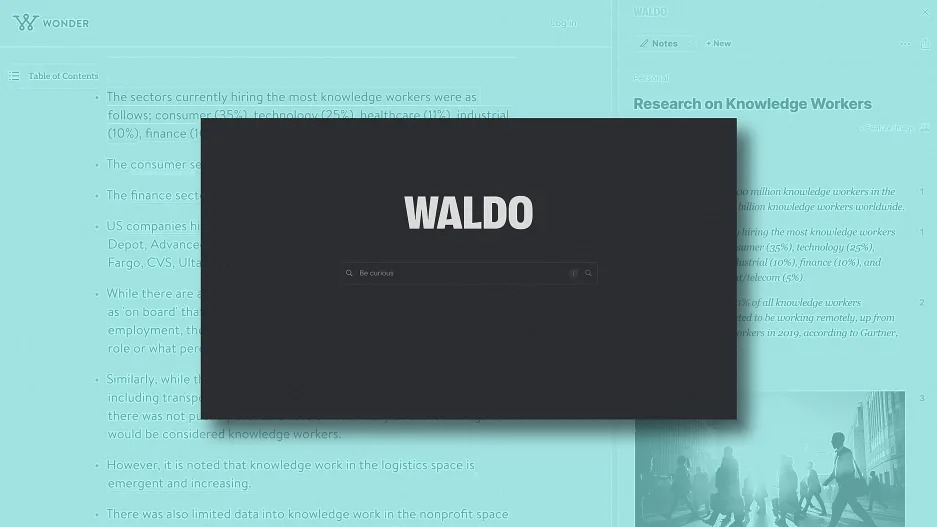- | 9:00 am
Meet Waldo, a new search engine that lets you hyper-tune your queries
Waldo’s customizable interface isn’t effortless, but it does give users more control over their search results.

Google search is getting worse. For lack of a better metaphor, or at the very least, a less clichéd one, searching for an answer often feels like searching for a needle in a haystack. Given the level of information that is available to us today, the needle—your needle—is almost definitely in there somewhere, but looking for it has become a bit of an Olympic sport.
Over the past six months, a new search engine has stealthily entered the scene. Named after the popular “Where’s Waldo” game, Waldo uses search indexes pulled from Google, Bing, and others, but packages the results into a different kind of interface that lets you hyper-tune your search with the click of a few buttons. You can choose the file type you want, highlight every single number with a percentage sign, and single out quotes in seconds. Going back to the needle metaphor, Waldo lets you hover a magnet over the haystack, so you can find it about twice as fast (based on customer feedback).
The company officially launched with a Chrome extension six months ago, but as of today, a more advanced version of it is also available as a stand-alone site and on mobile. Like Duck Duck Go or Bing, which launched respectively in 2008 and 2009, Waldo wants a slice of a search engine pie that Google claimed long ago. (As of December 2022, the tech giant held more than 92% of the global market share.) But on top of repackaging the search results so they don’t, say, lead with ads masquerading as independently sourced content, Waldo has turned the search landing page into a customizable interface that lets people have more control over their results, then expand on each of them without needing to open a conga line of tabs.
Let me explain. Once the results to your query are in, you can press “d” on your keyboard (or tick a box right in the filter menu) and Waldo will highlight all the datapoints in your search. Press “a” and it will give you a preview of several paragraphs you can expand and skim snippets of. Pick a “lens” and it will only show you results from academic sources, or left-or right-leaning media, or create your own “lens” and it will serve up results from sources you deem trustworthy. Choose “x-ray” and it will scour every single page for whatever you want to find—”like Command + F on steroid,” says Justin Wohlstadter, the founder and CEO Waldo. “A lot of what we’re trying to do is give the power back to the individual to arm themselves with an exoskeleton of knowledge where they can sift through a lot of the stuff a lot of faster.”
Ultimately, using Waldo is a bit like doing a Boolean search, but much more accessible. You can also take notes on a built-in notepad, then turn those notes into a fully fledged presentation in one click, or export into a Google Doc. (Compatibility with Notion and other programs is coming soon.) “Our hope is to own this whole research workflow and to make every part of that workflow, from finding, to saving to sharing, much, much better and faster,” says Wohlstadter.
Wohlstadter came up with the idea for Waldo after years working at an on-demand research service company called Wonder, which he founded in 2012 then left to start Waldo. Unlike Google and other search engines that use algorithms to analyze and find the most relevant results to your query, Wonder bills itself as “your personal research assistant” and employs humans who produce high-quality research reports in hours. “We’ve done millions and millions of hours of research as part of that company,” says Wohlstadter, “and in the process of doing all these millions of hours of research, we realized that everyone relies on Google, but Google isn’t built for work.”
Like Wonder, Waldo isn’t really for personal searches. You wouldn’t use it to find out if your dog can eat bananas, or why the sky is blue, although you could. Where you would get the most benefit is if you need to get a clear sense of the market size for home medical equipment, or to find a scientific study on the brain’s ability to make associations, both of which I have inquired for other stories. “There is a reason why we are focused first on people who use Google all day every day, the content creators who live inside Google,” says Wohlstadter. “Those people are willing to learn because they know it’s going to save them a lot of time.”
I found out about Waldo from a cold email aimed at “content specialists” and writers. I’ve been trialing it for more than a month (though not the new interface) and I agree with most other users so far, who, according to Wohlstadter, love the ability to search for datapoints and filter your results based on the kind of sources you want. As a journalist, finding reliable information quickly is paramount, but I could see Waldo being useful for anyone whose job requires reliable information, data, and trend insights.
Don’t get me wrong: The learning curve is there, and it can be steep. I still find myself defaulting to “rick-click, open new tab” whenever I want to expand on a search, and I haven’t yet taken the time to create my own “lens” with trusted publications. But in an era where content farms are churning out questionable articles and seemingly everyone is a content creator, Waldo is betting that fun, interactive tutorials—and the promise of better, faster results—will convince die-hard Googlers to make the switch to Waldo and stick with it.
For now, Waldo is free and doesn’t have official enterprise packages with any companies, though its website suggests it is used by people in some of the top consulting firms and financial institutions like Unilever and Bloomberg, and researchers from Stanford University. In the next few months, Wohlstadter envisions that some features, like the x-ray and the datapoints, will become paid. The million-dollar question is: Will people spend money on something they’re not used to?






































